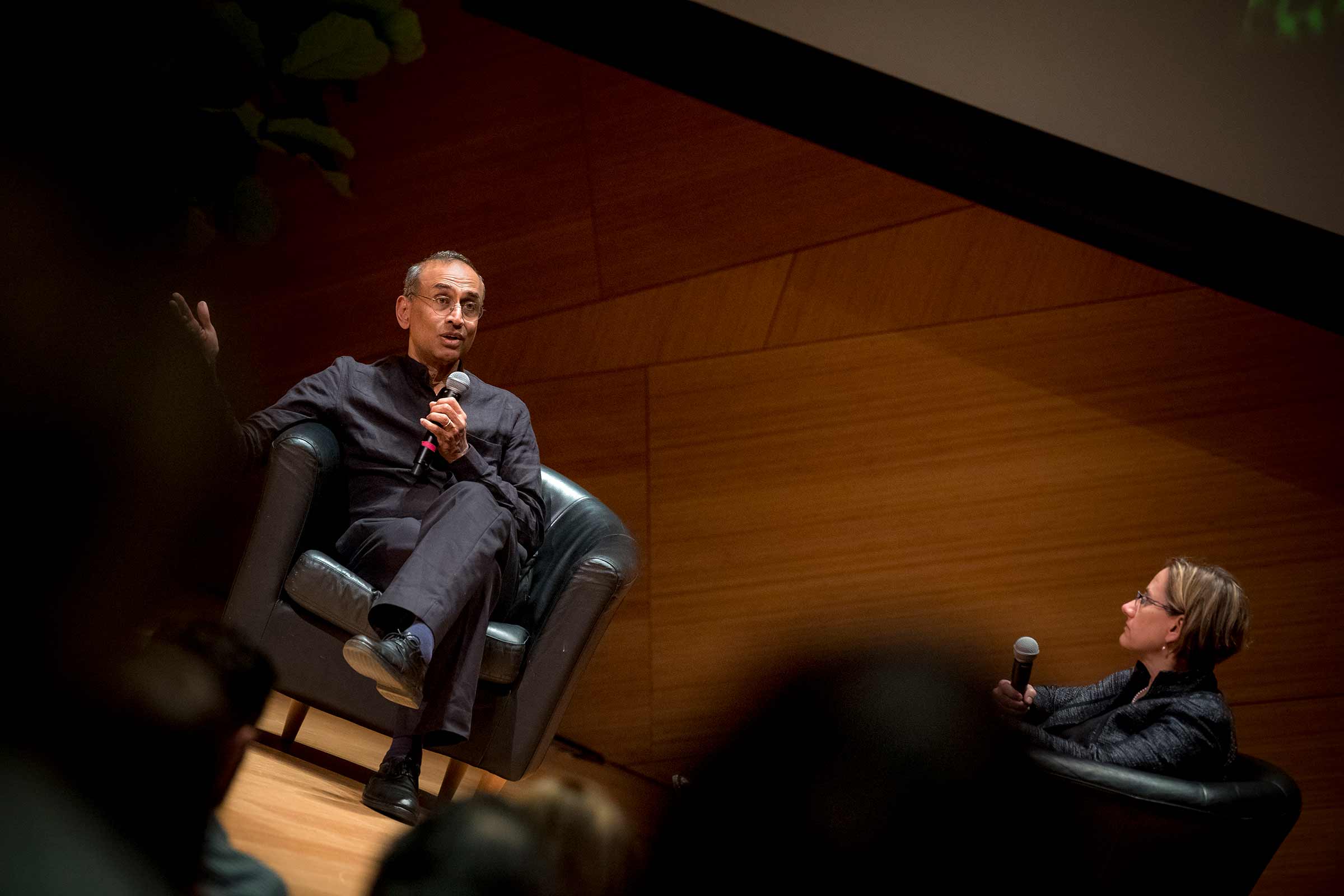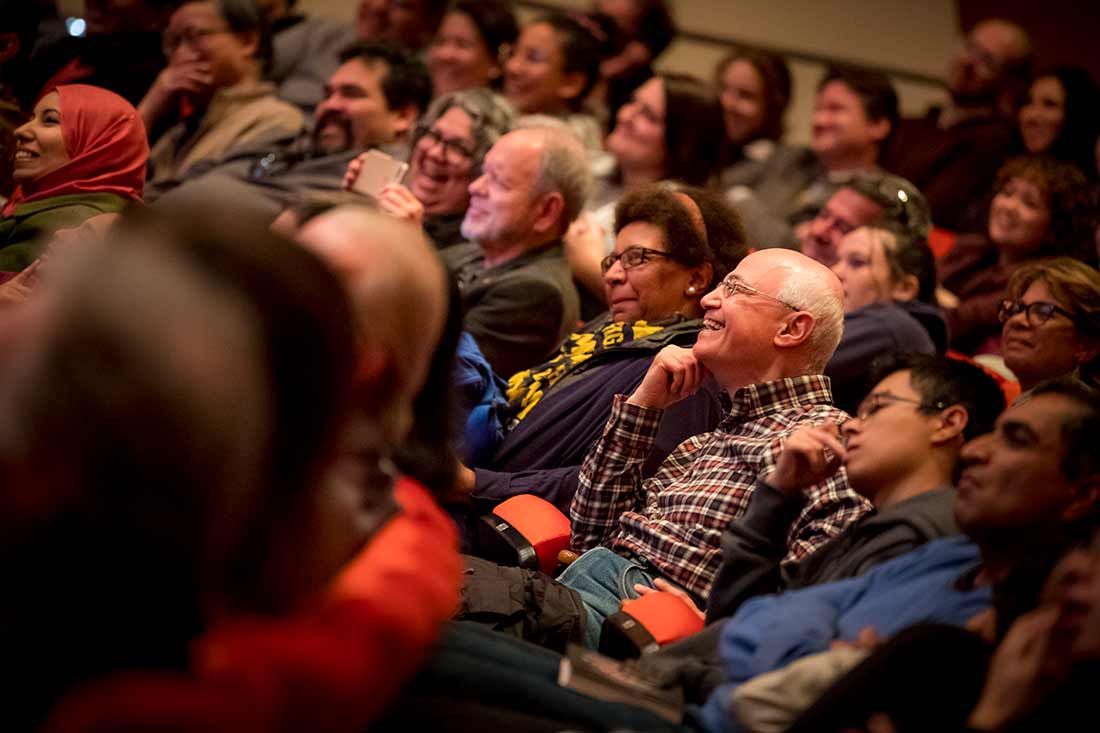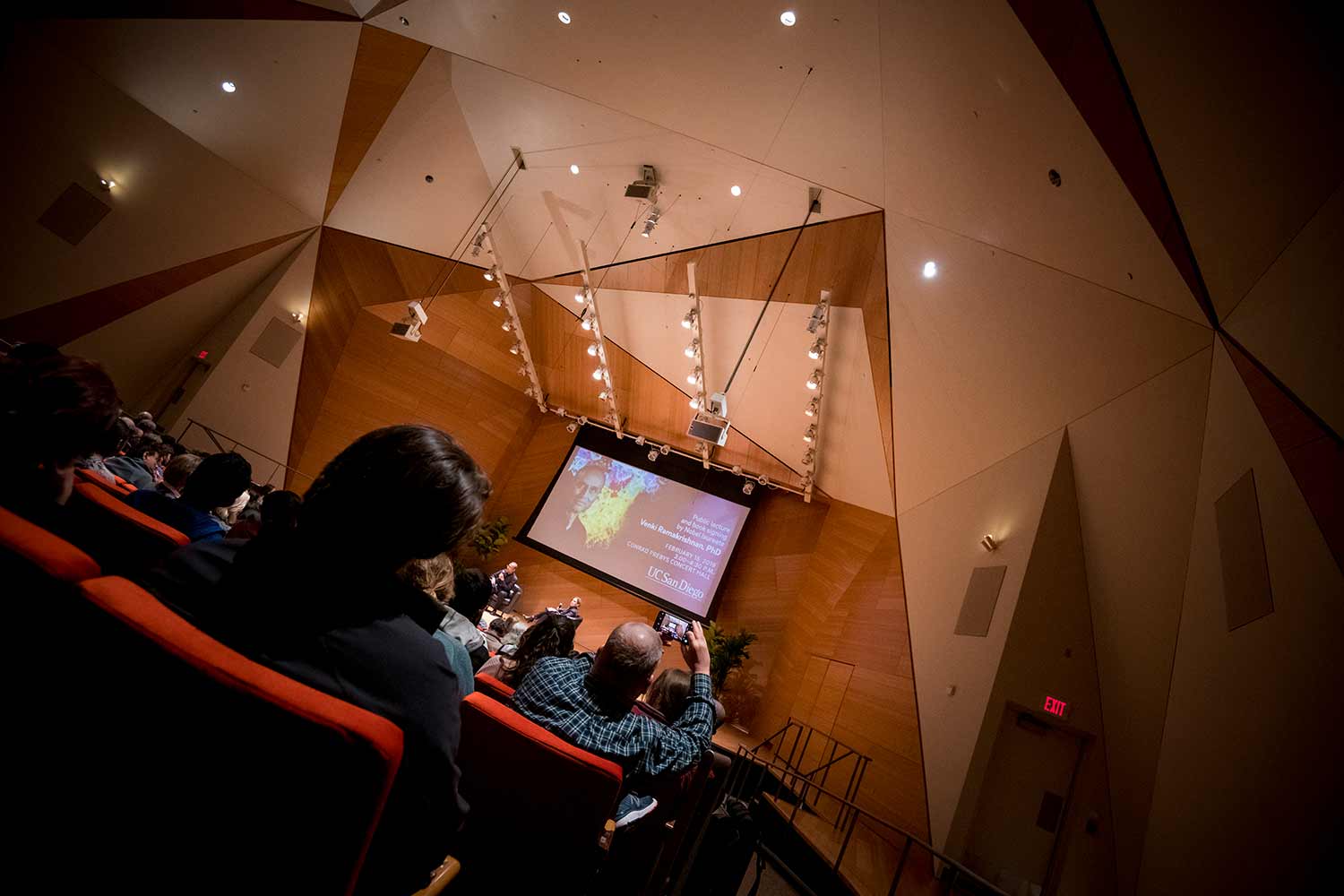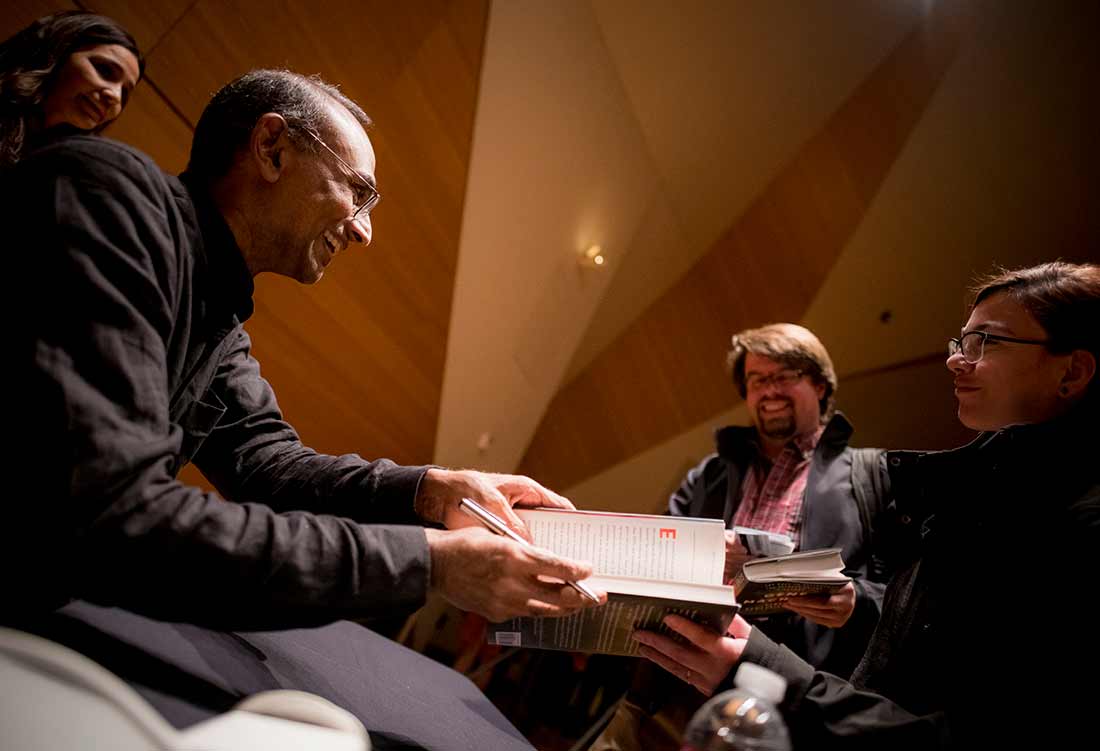
By:
- Mario C. Aguilera
Published Date
By:
- Mario C. Aguilera
Share This:
Insights from a Nobel Race and a Life in Science
Nobel laureate returns to UC San Diego to offer personal perspectives on gene machines and breakthrough science

Photos by Erik Jepsen/UC San Diego Publications
At a Feb. 15 public lecture, Nobel Prize winner and former UC San Diego graduate student Venkatraman “Venki” Ramakrishnan took his audience on a deep dive into the frontiers of research and a life in science.
During the hour-long presentation at UC San Diego’s Conrad Prebys Concert Hall, Ramakrishnan highlighted the major themes inside his recently published scientific memoir, “Gene Machine, the Race to Decipher the Secrets of the Ribosome.” Like the book, Ramakrishnan’s lecture engaged his audience with the perspective of someone who has lived through peaks and pitfalls on the way to scientific eminence, tempered with insights in a human, accessible style.

“Scientists are humans,” said Nobel Prize winner and former UC San Diego graduate student Venki Ramakrishnan during an insightful public lecture. “They have personalities, ambitions, egos and rivalries.”
At the core of his lecture, Ramakrishnan discussed the high-stakes race to uncover the structure of the ribosome, the molecular machinery that translates our genes into proteins. Known as the “mother of DNA,” ribosomes are a central component behind all life and the targets for the action of many antibiotics, yet most people know little about them.
The Nobel laureate describes to audiences the bumpy, twisting road he traveled on the road to scientific prominence. From the beginning of his story, Ramakrishnan is intent on delivering his tale from a candid and personal perspective, flipping the public perception that science is one clean, clear eureka moment after another.
“I wanted to tell a very frank story,” said Ramakrishnan during the lecture. “Most science books are very sanitized. They have a linear path and in hindsight everything is great… Even while we were solving the ribosome we were making all these mistakes and blunders. I thought it would make a great story.
“Often when scientists discuss their work, they talk about it in highly sanitized terms. Everything is very logical, everybody is on a noble quest. But the reality is that it doesn’t work that way. Science as an enterprise is very pure… but scientists are a different story altogether. Scientists are humans. They have personalities, ambitions, egos and rivalries. If you throw prizes into the mix, that’s adding gasoline to the fire.”
Ramakrishnan’s unusual story traces a path from his native India to a Ph.D. in physics from Ohio University. From there, his road abruptly took a turn with new aspirations of a career in biology, a field that was experiencing an explosion of discovery in the mechanics of life.
The Impact of UC San Diego
Ramakrishnan credits UC San Diego as one of the only universities willing to give him a chance in biology, given his background in physics.

At Venki Ramakrishnan’s public lecture inside Conrad Prebys Concert Hall, audience members were treated to lessons from a high-stakes race to unlock a Nobel Prize-winning mystery.
UC San Diego “really transformed my career and my subsequent life,” said Ramakrishnan of his time as a graduate student in the mid-1970s. After packing up a Ryder truck and moving his young family across the country, UC San Diego gave his new ambitions an opportunity to flourish. Here, he learned the basics of biology through noted professors such as Paul Price and Rick Firtel, and developed skills through hands-on biological research in Maurice Montal’s laboratory.
During his time at UC San Diego, Ramakrishnan read an article about the ribosome that piqued his interest. Scientists had little idea what the ribosome looked like at that point and Ramakrishnan was hooked into the quest to find out.
“When I came (to UC San Diego) I had no idea what a ribosome was,” said Ramakrishnan. “That’s something I learned while I was here. I knew that the ribosome was really important and complex… At the time it looked like a great thing to do because the whole ribosome was so huge that nobody had any idea what it looked like.”
He left UC San Diego after two years for a postdoctoral position at Yale. There, he began a decades-long hunt through several cities and laboratories to solve the puzzle of the structure of the ribosome, a quest that culminated with breakthrough discoveries and a 2009 Nobel Prize in Chemistry.
Lessons Learned along the Journey
To close his lecture, as well as during a question-and-answer session moderated by Division of Biological Sciences Dean Kit Pogliano, Ramakrishnan conveyed several lessons from his winding scientific life for students and others embarking on a scientific career.

Nobel Laureate Venki Ramakrishnan met with lecture attendees during a book signing for “Gene Machine, the Race to Decipher the Secrets of the Ribosome,” his recently published scientific memoir.
- On success as a scientist, which, he says, more than genius, comes down to a combination of money, skill, patience and luck: “If you are working on anything worthwhile, it’s going to be hard… Pick a problem that you really care about and like… That way you will care about it, no matter where the style is going.”
- On gaining knowledge: “I found that great scientists ask the dumbest questions at talks. It made me realize that questions aren’t dumb, they should be asked. You should never be afraid to show your ignorance … the only way to get out of ignorance is to ask and show your ignorance. Likewise, you shouldn’t be afraid to ask for help when you need it. You can’t pretend you know stuff if you don’t know it.”
- On new ideas: “You have to talk to people… the idea for how to solve the ribosome structure came out of a random conversation I had with a colleague… but you can’t talk to people all the time because then you’ll develop a pack mentality and you won’t be able to think originally. You’ve got to have your own ideas and mull over them and really obsess over them.”
- On confidence and doubt: “Everywhere I went, people would think, ‘these people around me are so smart and they’re going to find out how dumb I am and I’m gonna be exposed’… it’s called imposter syndrome and the fact is everybody has it. Even people you think are smart—they have it too.”
Share This:
You May Also Like
Stay in the Know
Keep up with all the latest from UC San Diego. Subscribe to the newsletter today.


